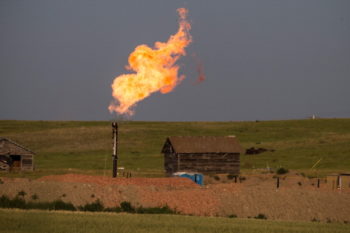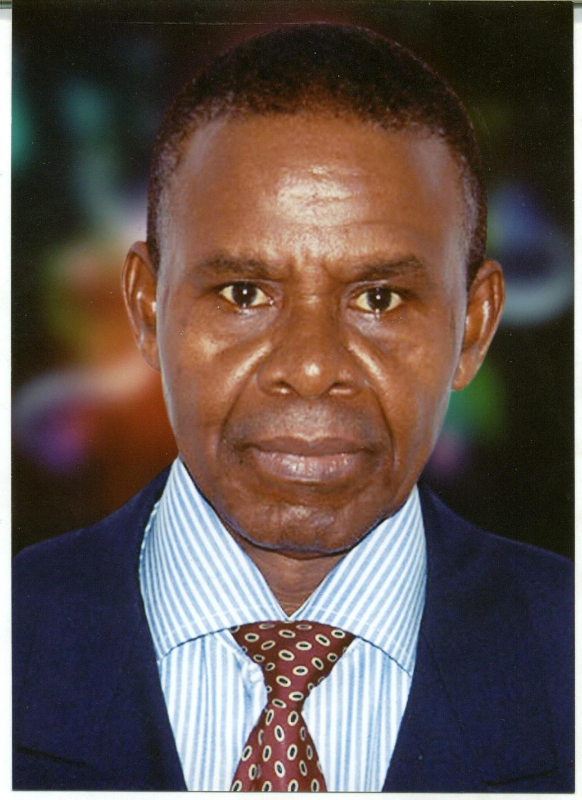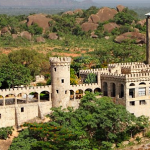
An aerial image of gas flares in the oil-producing states
Mr.Nwafo
By CHIMA NWAFO
The Niger Delta region currently lacks structure for environmental governance, despite sharing common ecological challenges. The leaders and institutions, like African governments, appear not to be working together in unity to address inherent environmental provocations. Perhaps, this could be attributable to the nature of politics in Africa, which is not geared towards providing solution to the people’s basic social, economic and cultural problems, however acute. Incidentally, no other African state represents this anomaly more than Nigeria, which has enjoyed decades of oil boom in the last four decades. The highest common denominator in the major oil-producing states is not premium dividends of democracy, but disturbing incidence of violent crime and youth restiveness.
The political leadership of the Niger Delta – like African heads of state and governments through the years – are so preoccupied with self-serving politicking that no one spares a thought as to how the states can seek a common front for the resolution of a common confrontation that not only threatens the present, but the future survival of the region. As a result of the global media attention generated by the issue of Climate Change and greenhouse emissions, it is most regrettable that the youth/student population, who should be more concerned about the future, has not shown appreciable interest in environmental issues; even if to follow the example of their peers in the developed world. Only last month, besides national protests in Europe, students from over 20 countries abandoned the comfort of their homes and classrooms to participate in an organized walk-out protest against what they perceive as uncaring or slow response of leaders to the rising threats of Climate Change.
Even though the thought of peaceful protests and walk-outs can be dreadful in Nigeria, given the antecedents of the Police in particular and security agencies in general, it is still a prominent constitutional means of making the people’s grievances known to the government, especially in democracy. This is where the silence or selective intervention of civil society organisations (CSOs) in the region becomes a source of worry. They should be the galvanizing force to bring the governors together for a dialogue on how they can forge a common front to wage a united war against the scourge of environmental degradation in the NDDC states.

If in doubt, the recent case where Friends of the Earth, Netherlands, took the global oil giant, Shell, to court is a notable instance. It was a joint action by an amalgam of civil society groups in the Netherlands, representing several countries and interest groups: All driven by one goal.
Roger Cox – who initially represented Urgenda in a historic case against Holland, in which the Dutch Appeals court ruled that a failure to achieve climate goals leads to human rights violations – is the one leading Friends of the Earth’s case against Shell, concerning which he said:
“If successful, the uniqueness of the case would be that Shell, as one of the largest multinational corporations in the world, would be legally obligated to change its business operations. We also expect that this would influence other fossil fuel companies, raising the pressure on them to change.”
As also reported in last week’s edition of the Environmental Orbit, a group of Zambian communities won a case at the Supreme Court against a British mining company that had consistently polluted their environment since 2004. “Companies like Vedanta can no longer so easily whitewash their reputation and assume a ‘cloak of respectability’ by virtue of a London listing. This is an historic day for victims of British multinational’s abuses worldwide.”
The two cases show beyond an iota of doubt, that a group of CSOs or and oil-bearing communities can jointly take action against both government agencies and multinational oil corporations for degradation of the Niger Delta ecology. This could be by litigation and peaceful protest.

But at a higher level, there is an urgent need for oil-producing states to create a structure for joint-action against all forms of environmental abuse, gathering of technical information that would aid the battle for remediation as well as battle against further degradation of the environment. When set up, such an institution could be representing the region at both local and international fora, as well as in articulating ecological issues at such events. United, it will be easier for the states to fight what Bayelsa State Governor Henry Seriake Dickson – who is uninhibitedly proactive in his approach to the challenge – rightly described as Environmental Terrorism, in a statement in which he unapologetically berated the activities of some oil multi-nationals operating in the state.
Available statistics equally show that such vice is not limited to Bayelsa. No one has investigated why the incidence of “cultism” and political assassination became so rife in Rivers State since the Fourth Republic, to the extent of creating what at a certain time was captured by analysts as “Rivers of blood.” The situation in the other states are not better, just that the incidence is as high or low as oil revenue/oil-production stakes, or level of political enlightenment.
For example, in Abia, the near-absence of youth restiveness could be attributable to a culture of political docility and the decreasing level of oil production in the area. Yet, exploitation with the destructive impacts of gas flaring and environmental pollution in Owaza community of Asa in Ukwa West Local Government Area of the state dates back to the ‘50s. After over five decades of such scourge, their spokesmen are more concerned about federal political appointments than environmental remediation. In fact, it’s rarely an issue for public discussion.

A major oil-producing state that seems to enjoy some measure of political calmness is Akwa Ibom State. The reason is simple: The bulk of their oil fields are in the Continental Shelf. Notwithstanding, the people of Eket where one of the oil giants is stationed, has had reasons to lament incidence of oil spillage and destruction of marine life in their waters. Like their keens in core Niger Delta, fishing is a major occupation in Eket and neighbouring towns of Oron and Ikot Abasi, formerly Egwanga Opobo, a popular source of cold water fish and shrimps among other genres.
Common environmental issues facing the Niger Delta region include sea level rise, coastal erosion, land degradation, oil spill/production pollution, illegal bunkering and gas flaring. Combined, these collectively endanger the people’s health and wreck their means of livelihood due to destruction of the entire ecosystem: farm lands, plant and marine life, sources of water supply and even the air they breed. This is not peculiar to any state in particular. It affects all the oil-bearing communities that constitute the nine states of the Niger Delta Development Commission (NDDC): Abia, Akwa Ibom, Bayelsa, Cross River, Delta, Edo, Imo, Ondo and Rivers.
*Nwafo, an Environmental/ Public Affairs Analyst, can be reached on: chi_dafo@yahoo.com; +2348029334754
Share
your story or I Witness Reports with us 24/7 via: SMS: +234 (0)9076248001
Whatsapp: +234(0)8072022024, Email: gatmashblog@gmail.com
Website: www.gatmash.com
For advert placement, contact us today via email: gatmashblog@gmail.com or call our hotlines on Tel: +234(0)8072022024, 08166622444, 09076248001









